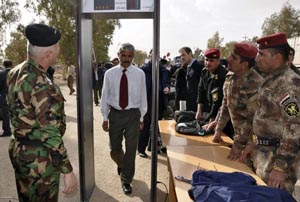KHALIS, Iraq — The transfer marks the end of a years-long effort by Iraqi authorities to evict members of the Mujahedeen-e-Khalq dissident group from Camp Ashraf, an isolated Saddam Hussein-era compound that the group was extremely reluctant to leave.
The MEK is staunchly opposed to Iran’s clerical regime, and thousands of its members were granted sanctuary inside Iraq by Saddam. It carried out a series of bombings and assassinations inside Iran in the 1980s and fought alongside Iraqi forces in the 1980-88 Iran-Iraq war.
Its fortunes inside Iraq turned sharply with Saddam’s ouster following the 2003 U.S.-led invasion. Iraq’s current Shiite-led government, which has been bolstering ties with neighboring Shiite powerhouse Iran, considers the group’s presence inside Iraq illegal and wants its followers out of the country.
Most of the residents of Camp Ashraf, where members of the group had lived for decades, reluctantly moved to a former U.S. military base near Baghdad airport last year. A core of about 100 MEK followers had stayed behind to protect and sell off the group’s remaining property.
A shooting on Sept. 1 left 52 of those residents dead. Another seven people are missing, according to the MEK. The group blames Iraqi security forces loyal to Prime Minister Nouri al-Maliki for the killings. Iraqi officials deny involvement and say an internal dispute is to blame.
United Nations officials visited the camp shortly after the shooting and condemned the bloodshed, but they have not reported any findings as to who was responsible.
Maj. Gen. Jamil al-Shimmari, the police chief of Diyala province, where the camp is located, and the mayor of the nearby town of Khalis, Oday al-Khadran, told The Associated Press that a convoy carrying the residents and their belongings left the camp Wednesday evening.
"This took a lot of patience. We dealt with them according to the law," al-Shimmari said. None of the Iraqi officials reported any incidents of violence during the transfer.
The residents were searched by Iraqi forces before departing and were allowed to visit the graves of loved ones who are buried at a cemetery inside the compound, al-Shimmari said. The residents initially refused to leave, but were eventually persuaded after representatives from the U.N. intervened, he added.
Authorities have prevented journalists from getting near the camp since the shooting this month.
A spokeswoman for the U.N. in Iraq, Eliana Nabaa, earlier in the day described the transfer process as "ongoing." She could not be reached for further comment after Iraqi officials confirmed the transfer had begun.
Representatives for the for MEK’s parent organization, the Paris-based National Council of Resistance of Iran, later confirmed the departure.
Mohammed Mohaddessin, chairman of the NCRI’s foreign affairs committee, said in an interview that the council’s president-elect, Maryam Rajavi, urged the remaining residents to leave over the past few days.
By QASSIM ABDUL-ZAHRA and ADAM SCHRECK,

